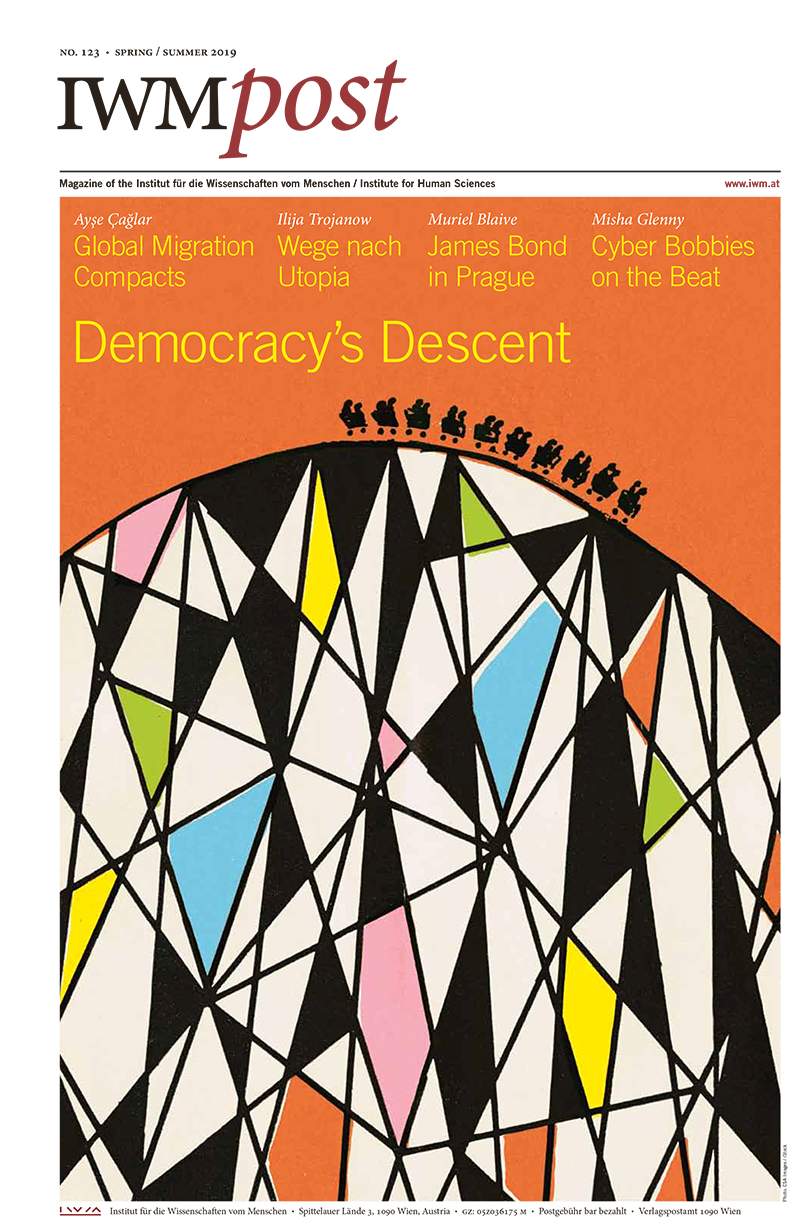Thirty years have passed since the fall of the Iron Curtain. The euphoria of that time has given way to the disillusionment of the present. Democratic achievements are increasingly called into question with the rise of populist forces. Hence the provocative title of the anthology “Wenn Demokratien demokratisch untergehen” (When democracies founder democratically), published in 2019 by IWM and Passagen Verlag, presented here with excerpts from Chantal Mouffe, Nadia Urbinati and Boaventura de Sousa Santos. Luiza Bialasiewicz and Sabrina Stallone also deal with the rhetoric of anti-democratic movements through the example of fascist movements in Italy. Migration—a subject that populists are all too eager to stress—is the subject of Ayşe Cağlar’s contribution, which highlights the importance of the concepts of protection and responsibility for the functioning of a global migration policy.
In an interview with Ludger Hagedorn, Pavel Barša explains how liberal elites can also pose a threat to democracy. Luke Cooper approaches the question of the outcome of Brexit negotiations “playfully”. The security implications of Britain’s withdrawal from the EU are in part the subject of Misha Glenny’s contribution on policing cybercrime—a problem James Bond did not have to deal with in the Cold War, as Muriel Blaive describes through the example of Eastern European stereotypes. Valentin Groebner’s contribution deals with clichés of a completely different kind and presents the history of the successful concept of purity from the Middle Ages to the present. Clemena Antonova sets out on an artistic search for traces, asking about what’s Russian about the Russian avant-garde. Meanwhile it is not the artists in the limelight, but the many actors behind the theatre curtain that are the focus of Zofia Smolarska’s essay. Katherine Younger takes a closer look at the ambivalent role that the newly created Orthodox Church of Ukraine plays for the country’s sovereignty.
While Adam Baczko, Gilles Dorronsoro and Arthur Quesnay ask how the peaceful protests in Syria in 2011 led to a devastating civil war, Vinh-Kim Nguyen explains how multi-resistant bacteria not only pose a danger to war victims but are increasingly spreading across the globe. Tobias Berger, on the other hand, uses the model of informal courts in Bangladesh to describe how conflicts can be resolved at the local level. Positive examples like this, which show that another world is possible, are decisive for Ilija Trojanow in overcoming the passivity of contemporary pessimism. He invites all of us to break new ground and open ourselves up to Utopia.
Anita Dick
Marion Gollner
Download the IWMpost 123 as a PDF
Contents
Visions Of the Future
Alle Wege führen durch Utopia / von Ilija Trojanow
Global Migration Politics
Envisioning a Global Order of Migration: The UN Compacts / by Ayşe Çağlar
The Future of Democracy
Why Liberal Elites can be Dangerous to Democracy / Interview with Pavel Barša by Ludger Hagedorn
Vorhang auf oder Schotten dicht? Was bleibt von 1989? / Debates at the Burgtheater
Smoke and Mirrors: On new-Fascist Urban Tactics / by Luiza Bialasiewicz and Sabrina Stallone
Wenn Demokratien demokratisch untergehen / Beiträge von Chantal Mouffe, Nadia Urbinati und Boaventura De Sousa Santos
Legacies of the Cold War
Unlock the 007 in You: James Bond in Prague / by Muriel Blaive
Global Politics and Security
Cyber Bobbies on the Beat: Policing in the Digital Age / by Misha Glenny
Geopolitical Talks: New Series of Public Debates
Why Did Syrians Rebel? / by Adam Baczko, Gilles Dorronsoro and Arthur Quesnay
The New Bacterial Warfare / Interview with Vinh-Kim Nguyen by Julia Sica
Europe’s Futures
We wargamed the last days of Brexit. Here’s what we found out / by Luke Cooper
Scales of Justice
Translating the Rule of Law in Bangladesh / von Tobias Berger
IWM Lectures in Human Sciences
„Mach mich rein!“ Aber wovon? / von Valentin Groebner
Publications
Spirit of Solidarity
Theatres: Romantic Fortresses or Models for Civic Society? / by Zofia Smolarska
Krzysztof Michalski and IWM Archives
Arts and Politics
What’s Russian about the Russian Avant-garde? / by Clemena Antonova
Faust Zyklus 2018: Ausstellung von Maxim Kantor / von Julia M. Nauhaus
Religion and Politics
The Dilemma of Ukrainian Orthodoxy / by Katherine Younger
Upcoming Events
Impressum
Editors: Marion Gollner, Anita Dick
Editorial Assistance: Simon Garnett, Christina Pössel, Andrea Roedig, Benjamin D. Tandler, Kate Younger.
Design: steinkellner/zotter, www.steinkellner.com
Printed by Grasl FairPrint, 2540 Bad Vöslau.
IWMpost is published two times a year.
Current circulation: 7,500
